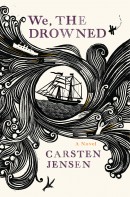A weekly roundup of noteworthy reviews from other sources.
 Michael Dirda reaches early and often for the top-shelf bag of references in praising We, the Drowned, Carsten Jensen’s novel about a century in the life of a Danish port city. He compares it to One Hundred Years of Solitude, Buddenbrooks, and Blood Meridian, and its author to Hamlet and Kierkegaard. So, yeah, maybe this one deserves a shot. Dirda concludes that it “isn’t just a book about Danish sailors, it’s a novel about what one must call — and forgive the grandiose phrase — the sorrowful human condition.” . . . Malcolm Jones is spellbound by a new Library of America collection of primary sources from the Civil War: “As the testimony accumulates, a profound portrait of a nation in crisis emerges, conjuring the epic quality of the conflict and its consequences as almost nothing before it. It is both mesmerizing and deeply troubling, and it will forever deepen the way you see this central chapter in our history.” . . . Thomas Mallon reviews the letters of Bruce Chatwin: “Throughout the letters he mailed from Kabul and Kenya and Katmandu, one can find fast, sharp renderings of misadventures and mores: ‘I’m afraid that most traditional Russian hospitality is a deep-seated desire to see foreigners drunk.’ And yet, this great traveler was probably too much on the move to become one of the great letter-writers.” . . . Rupert Thomson reviews an “eccentric, candid,” “riotously funny,” “profoundly moving,” and “quintessentially — and unashamedly — English” book about two brothers that might or might not blend fiction with its facts. “Barrow has a wonderfully restrained or concealed tone — often tongue-in-cheek, but never arch. His use of anecdote is both masterly and thriftless; he takes episodes around which less skillful writers would have built entire chapters and delivers them in a few perfectly weighted sentences.” . . . Raymond Tallis reviews the latest in books about consciousness: “[T]hese two books have greater merits than many contenders in an overcrowded field, though they fail to give a coherent neurological account of even the most basic elements of consciousness.” . . . Adam Kirsch reviews a book about the different ways Jews and Christians approach and interpret the Bible, and the “disparity between Americans’ absolute faith in the Bible and their evident ignorance of it.” . . . The always incisive Jim Holt considers at length Nicholas Carr’s book about how the Internet may be reshaping our brains for the worse: “He fails to clinch his case that the computer is making us stupider. Can he convince us that it is making us less happy?”
Michael Dirda reaches early and often for the top-shelf bag of references in praising We, the Drowned, Carsten Jensen’s novel about a century in the life of a Danish port city. He compares it to One Hundred Years of Solitude, Buddenbrooks, and Blood Meridian, and its author to Hamlet and Kierkegaard. So, yeah, maybe this one deserves a shot. Dirda concludes that it “isn’t just a book about Danish sailors, it’s a novel about what one must call — and forgive the grandiose phrase — the sorrowful human condition.” . . . Malcolm Jones is spellbound by a new Library of America collection of primary sources from the Civil War: “As the testimony accumulates, a profound portrait of a nation in crisis emerges, conjuring the epic quality of the conflict and its consequences as almost nothing before it. It is both mesmerizing and deeply troubling, and it will forever deepen the way you see this central chapter in our history.” . . . Thomas Mallon reviews the letters of Bruce Chatwin: “Throughout the letters he mailed from Kabul and Kenya and Katmandu, one can find fast, sharp renderings of misadventures and mores: ‘I’m afraid that most traditional Russian hospitality is a deep-seated desire to see foreigners drunk.’ And yet, this great traveler was probably too much on the move to become one of the great letter-writers.” . . . Rupert Thomson reviews an “eccentric, candid,” “riotously funny,” “profoundly moving,” and “quintessentially — and unashamedly — English” book about two brothers that might or might not blend fiction with its facts. “Barrow has a wonderfully restrained or concealed tone — often tongue-in-cheek, but never arch. His use of anecdote is both masterly and thriftless; he takes episodes around which less skillful writers would have built entire chapters and delivers them in a few perfectly weighted sentences.” . . . Raymond Tallis reviews the latest in books about consciousness: “[T]hese two books have greater merits than many contenders in an overcrowded field, though they fail to give a coherent neurological account of even the most basic elements of consciousness.” . . . Adam Kirsch reviews a book about the different ways Jews and Christians approach and interpret the Bible, and the “disparity between Americans’ absolute faith in the Bible and their evident ignorance of it.” . . . The always incisive Jim Holt considers at length Nicholas Carr’s book about how the Internet may be reshaping our brains for the worse: “He fails to clinch his case that the computer is making us stupider. Can he convince us that it is making us less happy?”

